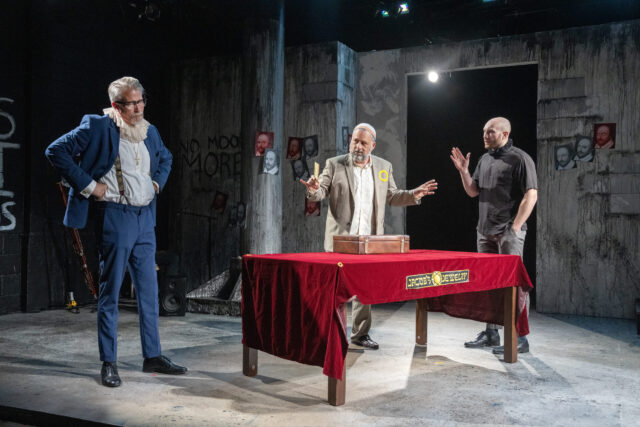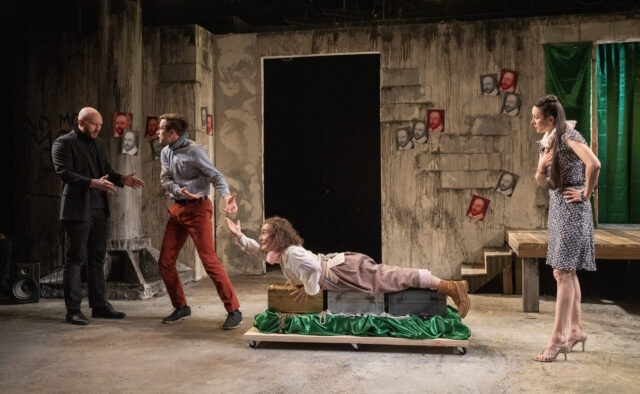
Jacob (Jeremy Kareken, center) negotiates a deal with Antonio (Eric Oleson) and Bassanio (Chapman Hyatt) in The Shylock and the Shakespeareans (photo by Richard Termine)
THE SHYLOCK AND THE SHAKESPEAREANS
New Ohio Theatre
154 Christopher St.
Wednesday – Sunday through June 17, $20 streaming, $30 in person
www.untitledtheater.com
newohiotheatre.org
The premise for Edward Einhorn’s The Shylock and the Shakespeareans is filled with intriguing possibilities: a reimagining of William Shakespeare’s The Merchant of Venice in which the Bard is the hero of a ragtag mob of racists and anti-Semites. Unfortunately, the execution doesn’t quite live up to the promise.
As the audience enters the New Ohio Theatre (for what will be the venue’s final full-length presentation before it closes), musician and composer Richard Philbin is in a corner, playing wonderful Klezmer/medieval-tinged tunes on flute, clarinet, and bassoon, which he continues doing throughout the show. Mike Mroch’s set is a dark alley with graffiti on concrete walls — “The Jews Will Not Replase Us,” misspelled to immediately establish the ignorance of the bigots — along with dozens and dozens of pictures of Shakespeare, many with his eyes ripped out, evoking one of the playwright’s most famous and controversial soliloquies, which begins, “Hath not a Jew eyes?”
What Einhorn calls “A Comedy with Tragic Elements” starts with a prologue in Venice in which the Jewish Jessica (Yael Haskal) and the Asian Christian Lorenzo (Chase Lee) are spotted together making out by Salarino (Ethan Fox) and Salarina (Janine Hagerty), who are wearing white hoods that we soon learn are the mark of the Ku Klux Klan–like Shakespeareans. “They have witchcraft in their lips,” Salarina says about the couple. “Lorenzo loves not wisely.”
The central plot of The Shylock and the Shakespeareans is similar to that of The Merchant of Venice. Bassanio (Chapman Hyatt) is in love with heiress Portia (Nina Mann) and wants to flaunt his love by gifting her diamonds that cost three thousand ducats. Bassanio has no money, so he asks his older cousin Antonio (Eric Oleson), a rich merchant, to loan him the cash, but Antonio explains that his wealth is all tied up in ships that are out at sea. Instead, Bassanio convinces Antonio to meet with Jacob (Jeremy Kareken), a Jewish jeweler, to make a deal.
“How many times have I told you? Never trust a Jew,” Antonio tells his cousin. “They are sneaks. They are liars. And they are cannibals.” When Bassanio questions Antonio’s belief that Jews are flesh-eating devils, Antonio explains that it all comes from Shakespeare, that the Bard “opened my eyes about a lot of things.” Bassanio responds, “I don’t know, Antonio. Some of the people at his rallies, they seem a little crazy. That Gobbo guy, he scares me.” A disappointed Antonio complains, “You always have to put him down. I don’t know why you have to do that.” The scene brings to mind Donald Trump’s defense of the people involved in the 2017 Unite the Right march in Charlottesville and the January 6 insurrectionists, with Gobbo (Craig Anderson) a kind of QAnon Shaman or Proud Boy leader. In addition, Gobbo has no love lost for Terach (Kingsley Nwaogu), a Black Jew who is Jacob’s only friend. Defending his hate, Gobbo, formerly Jacob’s servant, says, “I just say in public the things that most people say in private.”
Antonio refuses to call Jacob by his real name, instead referring to him by the derogatory term “shylock,” which he tells Bassanio means, according the Shakespeare, “don’t trust them.” Their initial meeting features the best exchange in the play.
Antonio: This is the shylock?
Jacob: Jacob is my name.
Antonio: I know who you are.
Jacob: I know who you are too. You and a gang of Shakespeareans vandalized our synagogue. You were one of the ring leaders.
Antonio: The synagogue, Bassanio, is where shylocks do their business.
Jacob: It’s where we pray.
Antonio: You prey upon us there and everywhere.
Jacob: I mean prayers. Like in a church.
Antonio: The devil can cite scripture for his purpose.
Bassanio: Wait, I think I’ve heard that before. Who said that?
Jacob & Antonio: Shakespeare.

Portia’s (Nina Mann) suitors must choose from three boxes in reimagining of The Merchant of Venice (photo by Richard Termine)
Whereas in The Merchant of Venice it is Shylock who demands a pound of flesh if Antonio defaults on the loan, a troublesome plot point that to this day does no favors for Jews, painting them as vicious businessmen, Einhorn instead has Bassanio suggest it, offering, “If you are not paid, you can take a bite out of my Christian flesh. From wherever you like.” Antonio demands, “Not his flesh! Mine. You can eat mine. Or cook it into matzo.” Jacob argues, “Matzo is just flour and water.” Antonio cries out, “And Christian children.” They eventually arrive at an agreement in which Jacob will charge Bassanio three thousand ducats — the actual cost — for a diamond necklace, and Antonio will pay for it once his ships arrive back home. In lieu of interest, Antonio will have to tell his fellow Shakespeareans that Jews do not eat Christians, convincing them that the blood libel is a lie.
Meanwhile, Morocco (Nwaogu) and Aragon (Fox) join Bassanio as suitors for Portia’s hand, having to choose the correct box out of three: a gold one that says, “Who chooseth me shall gain what many men desire,” a silver one that says, “Who chooseth me shall get as much as he deserves,” and a lead one that says, “Who chooseth me must give and hazard all he hath.” Portia, who also is an unscrupulous cross-dressing judge, is assisted by her servant, Nerissa (Stephanie Lichtfield), who sleeps in the stables and lusts after Gratiano (Thomas Shuman), who works for Antonio.
There’s much to admire in the first half of the play, with solid character development, strong dialogue, and terrific music. Kareken, who cowrote the Broadway play The Lifespan of a Fact, is stalwart as Jacob, portraying him as a bold and brave man with high principles who is not about to let others get the best of him, a stand-in for the Jewish people around the world, particularly today, when the rise of anti-Semitism is everywhere. Oleson gives Antonio just the right edge, an intelligent man who should know better but has fallen under the spell of the Shakespeareans. Ramona Ponce’s costumes, which meld medieval with modern, are highlighted by the Elizabethan ruffs worn by the bigots around their necks and the yellow circles on the lapels of the Jews, a reference to the rotas that Jews had to wear in Europe beginning in 1217 and which became the Star of David under the Nazis.
The play — a follow-up to Einhorn’s 1997 A Shylock, the first full play from his troupe, Untitled Theater Company No. 61 — loses steam as Einhorn (Alma Baya, City of Glass) turns the focus on Jessica, who has converted to Christianity and eloped with Lorenzo. She is disappointed that Lorenzo is friends with Antonio even though Antonio believes that “Venice is for the Venetians. Not for foreigners and certainly not for Jews.” Not only are the Shakespeareans — the Middle Ages version of the America First movement — anti-Semitic and racist but they also despise immigrants while controlling the narrative. “Your friends spread hate,” Lorenzo tells Antonio, who replies in classic bigot projection, “We are the victims of hate. No one is hated more unfairly than the Shakespeareans.”
Although Einhorn calls attention to critical matters that are still relevant today, the tale grows ever more choppy, with overblown and repetitive slapstick competing with poignant drama. Jessica’s interaction with Portia feels forced, and what happens after Jacob speaks the famous words “I am content” is confounding in multiple ways as Einhorn attacks the current scourge of white supremacy, perhaps born in part from the legacy of Shakespeare’s play. The work also raises important questions about the future of Jewish culture amid so much hatred and intermarriage, lamenting what Shakespeare and others have wrought over the centuries, but those discussions seem squeezed in.
“We know a threat when we see it,” Antonio warns Jacob. “You want us to be blind, but Shakespeare has opened our eyes.” After all these years, it’s a tragedy that so many still need their eyes opened to the truth.